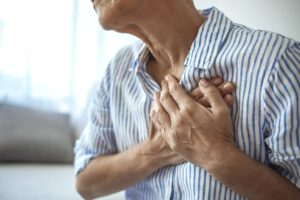 February is American Heart month, so let’s take a look at one of the most severe injuries you can have to your heart: heart attacks.
February is American Heart month, so let’s take a look at one of the most severe injuries you can have to your heart: heart attacks.
Many don’t really know what a heart attack feels like and the warning signs, even though more than 800,000 occur in the United States every year, a number that the American College of Cardiology predicts will continue to rise.
Advertisement
Heart attacks are life-threatening emergencies that require immediate treatment. They cause damage to the heart and can lead to serious health issues or death. Knowing the signs and symptoms is one way to reduce the risk of severe damage or death.
A heart attack is a blockage of one of your coronary arteries. Think of it like the plumbing in your house: when a pipe gets blocked and blood can’t flow through, the muscle that’s feeding it starts to die.
The American Heart Association (AHA) says a coronary artery can be blocked by a buildup of fat, cholesterol, or other substances that partially or completely block blood flow to a part of the heart.
Reduced blood flow results in a lack of oxygen, which can damage the heart muscle or cause death.
Advertisement
Signs and symptoms of a heart attack can range from mild to severe and vary from person to person. They can include:
– Pain or discomfort in the chest, arm, or shoulder
– Lightheadedness, nausea, vomiting
– Pain in the jaw, neck, or back
– Shortness of breath
There are some common signs and symptoms of heart attacks, but they do not all look the same. Symptoms can be quite different for women and men, typically resulting in women waiting longer to get treatment. They often don’t even consider their symptoms a warning sign.
Chest pain and pressure, for example, are less common in women. More likely symptoms include:
– Fatigue or weakness
– Sleep disturbances
– Shortness of breath
– Heartburn or indigestion
– Unusual fatigue
– Anxiety or feelings of impending doom
– Pain or pressure in the lower chest or upper abdomen
If you’re feeling any of these symptoms, call 911 or have somebody immediately take you to the hospital.
